Unit 1 How can we become good learners. Section B(Period 3) 课件 (共55张PPT无素材)
文档属性
| 名称 | Unit 1 How can we become good learners. Section B(Period 3) 课件 (共55张PPT无素材) | 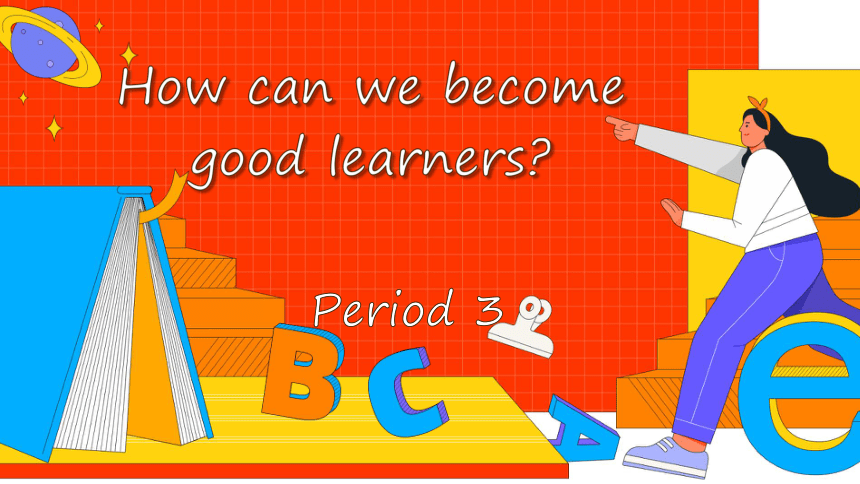 | |
| 格式 | zip | ||
| 文件大小 | 9.0MB | ||
| 资源类型 | 教案 | ||
| 版本资源 | 人教新目标(Go for it)版 | ||
| 科目 | 英语 | ||
| 更新时间 | 2022-08-14 16:20:13 | ||
图片预览

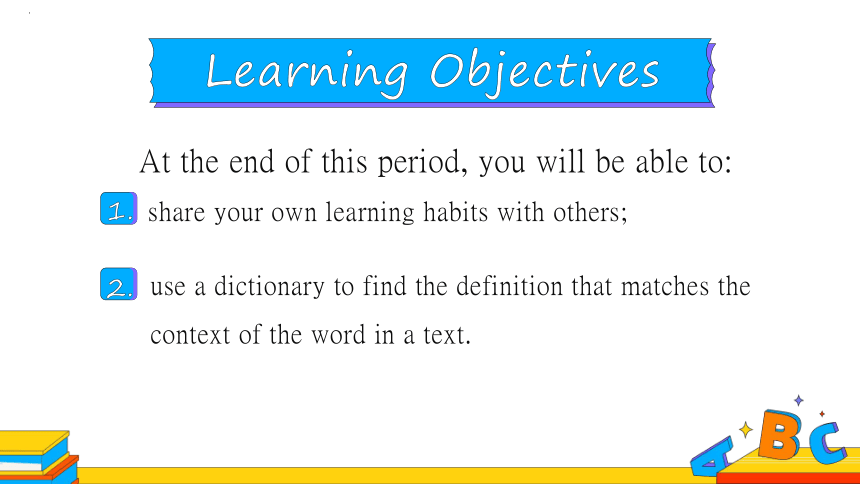
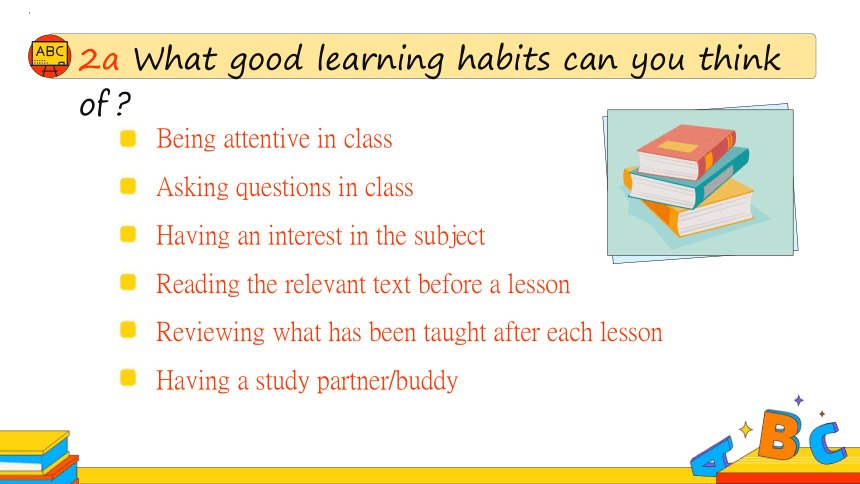
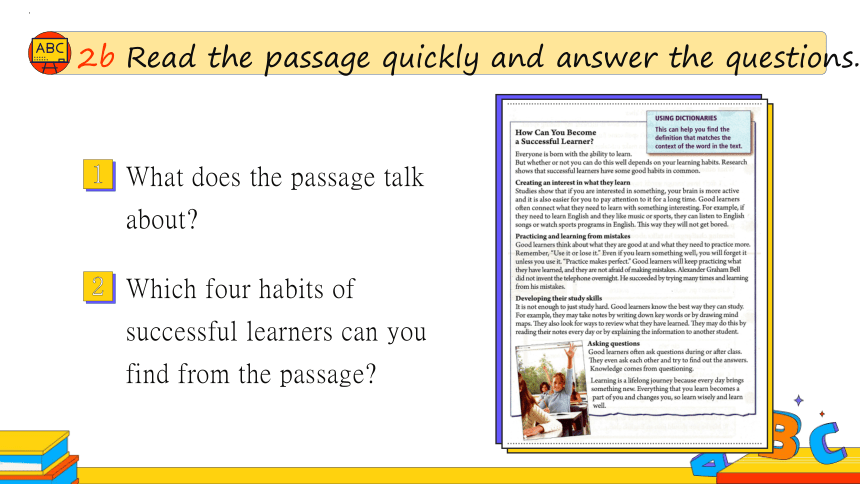
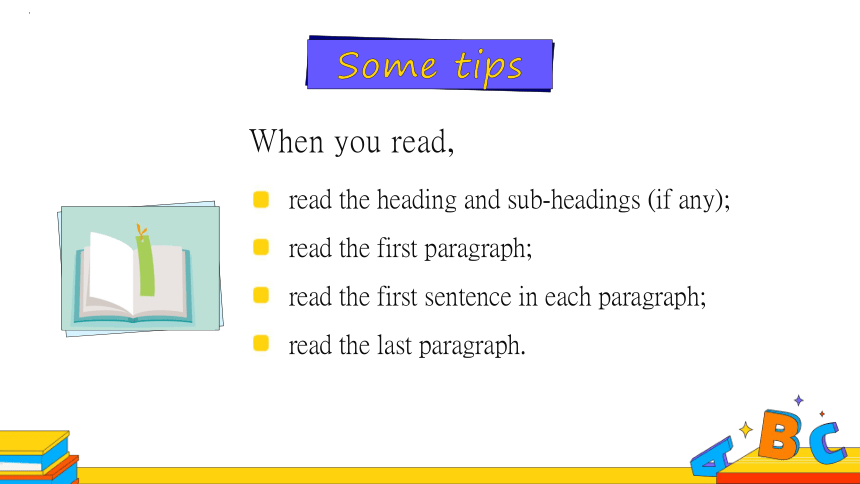
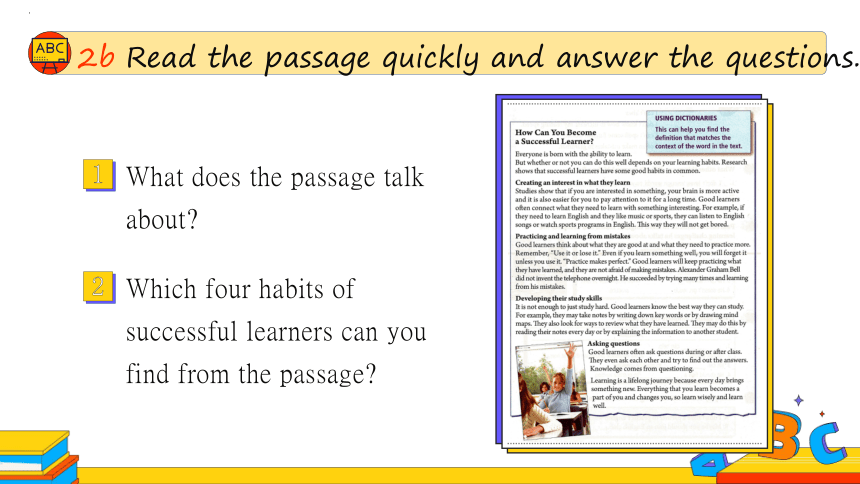
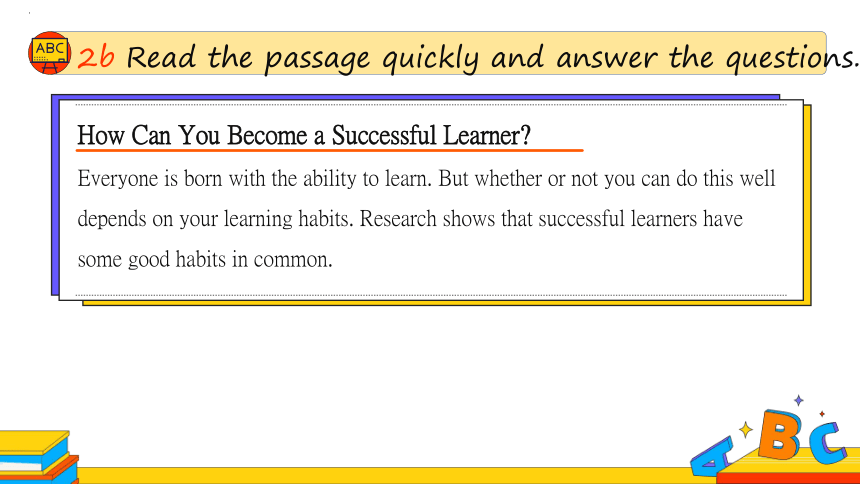
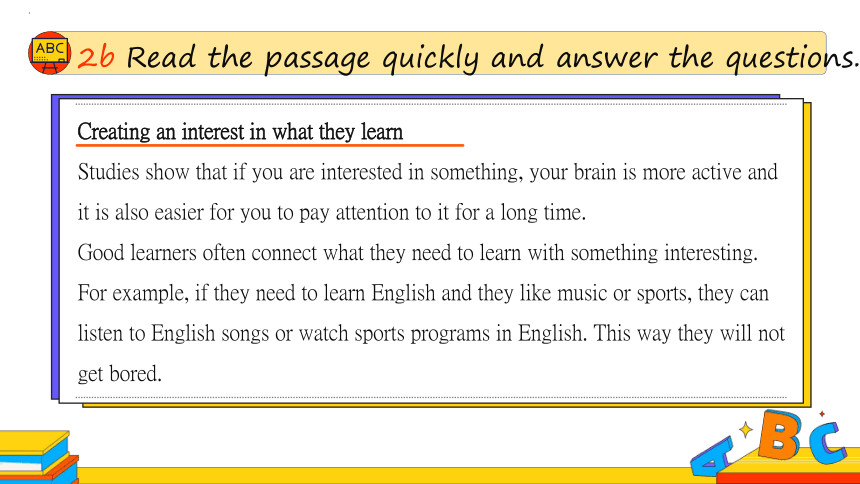
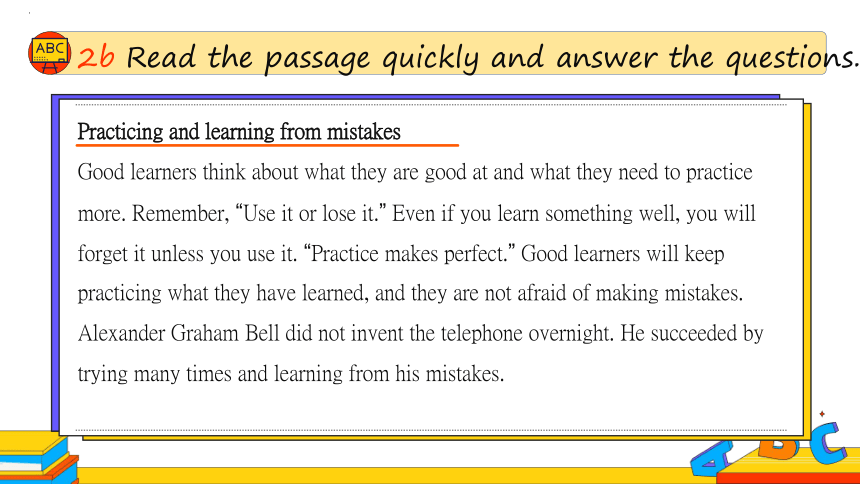
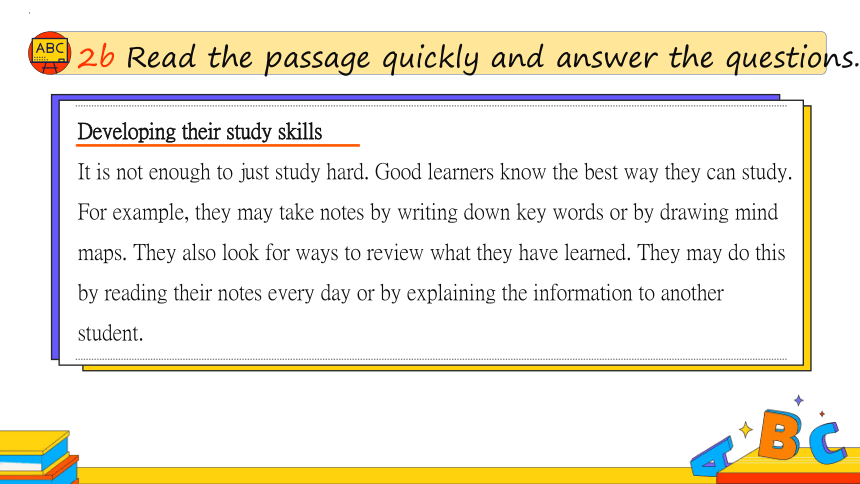
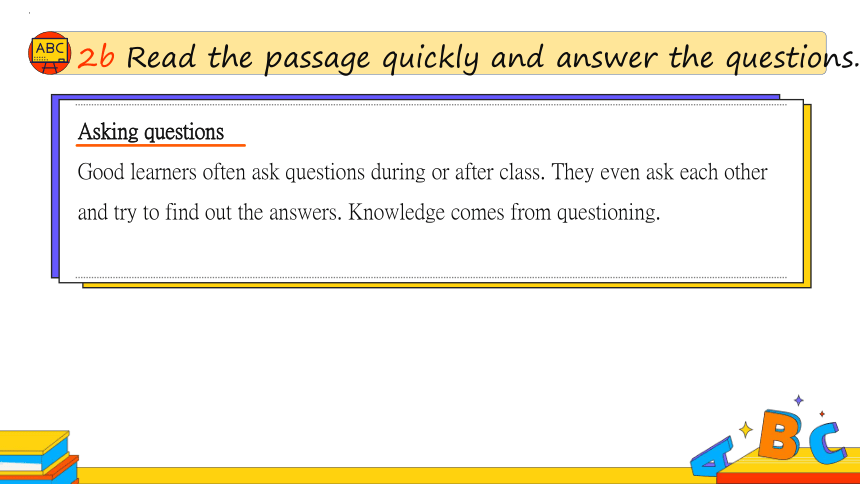
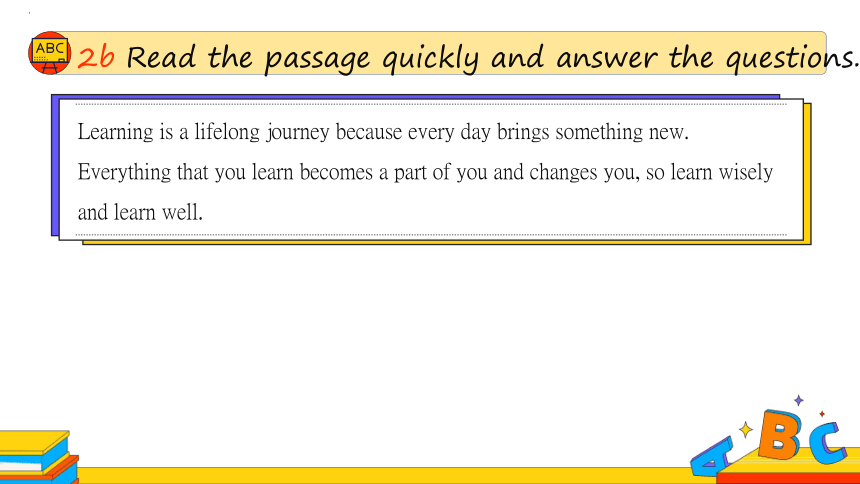
文档简介
(共55张PPT)
How can we become good learners
Period 3
Learning Objectives
At the end of this period, you will be able to:
use a dictionary to find the definition that matches the context of the word in a text.
2.
share your own learning habits with others;
1.
Being attentive in class
Asking questions in class
Having an interest in the subject
Reading the relevant text before a lesson
Reviewing what has been taught after each lesson
Having a study partner/buddy
2a What good learning habits can you think of
1
What does the passage talk about
2
Which four habits of successful learners can you find from the passage
2b Read the passage quickly and answer the questions.
Some tips
When you read,
read the heading and sub-headings (if any);
read the first paragraph;
read the first sentence in each paragraph;
read the last paragraph.
1
What does the passage talk about
2
Which four habits of successful learners can you find from the passage
2b Read the passage quickly and answer the questions.
How Can You Become a Successful Learner
Everyone is born with the ability to learn. But whether or not you can do this well depends on your learning habits. Research shows that successful learners have some good habits in common.
2b Read the passage quickly and answer the questions.
Creating an interest in what they learn
Studies show that if you are interested in something, your brain is more active and it is also easier for you to pay attention to it for a long time.
Good learners often connect what they need to learn with something interesting. For example, if they need to learn English and they like music or sports, they can listen to English songs or watch sports programs in English. This way they will not get bored.
2b Read the passage quickly and answer the questions.
Practicing and learning from mistakes
Good learners think about what they are good at and what they need to practice more. Remember, “Use it or lose it.” Even if you learn something well, you will forget it unless you use it. “Practice makes perfect.” Good learners will keep practicing what they have learned, and they are not afraid of making mistakes. Alexander Graham Bell did not invent the telephone overnight. He succeeded by trying many times and learning from his mistakes.
2b Read the passage quickly and answer the questions.
Developing their study skills
It is not enough to just study hard. Good learners know the best way they can study. For example, they may take notes by writing down key words or by drawing mind maps. They also look for ways to review what they have learned. They may do this by reading their notes every day or by explaining the information to another student.
2b Read the passage quickly and answer the questions.
Asking questions
Good learners often ask questions during or after class. They even ask each other and try to find out the answers. Knowledge comes from questioning.
2b Read the passage quickly and answer the questions.
Learning is a lifelong journey because every day brings something new.
Everything that you learn becomes a part of you and changes you, so learn wisely and learn well.
2b Read the passage quickly and answer the questions.
How Can You Become a Successful Learner
Everyone is born with the ability to learn. But whether or not you can do this well depends on your learning habits. Research shows that successful learners have some good habits in common.
1
What does the passage talk about
It talks about how to become a successful learner.
/Some good habits that successful learners have in common.
2b Read the passage quickly and answer the questions.
2
Which four habits of successful learners can you find from the passage
Creating an interest in what they learn;
Practicing and learning from mistakes;
Developing their study skills;
Asking questions.
2b Read the passage quickly and answer the questions.
2c Read the 1st paragraph and answer the question.
How Can You Become a Successful Learner
Everyone is born with the ability to learn. But whether or not you can do this well depends on your learning habits. Research shows that successful learners have some good habits in common.
1
Does the writer think that everyone is born with the ability to learn well
No.
2c Read the 2nd paragraph and answer the questions.
Creating an interest in what they learn
Studies show that if you are interested in something, your brain is more active and it is also easier for you to pay attention to it for a long time.
Good learners often connect what they need to learn with something interesting. For example, if they need to learn English and they like music or sports, they can listen to English songs or watch sports programs in English. This way they will not get bored.
3
What do good learners do when they need to learn something
2
Why is it a good idea to connect something you need to learn with something you are interested in
2c Listen to the 2nd paragraph and answer the questions.
2
Why is it a good idea to connect something you need to learn with something you are interested in
Because studies show that if you are interested in something, your brain is more active and it is easier for you to pay attention to it for a long time.
You will also not get bored.
Creating an interest in what they learn
Studies show that if you are interested in something, your brain is more active and it is also easier for you to pay attention to it for a long time.
Good learners often connect what they need to learn with something interesting. For example, if they need to learn English and they like music or sports, they can listen to English songs or watch sports programs in English. This way they will not get bored.
3
What do good learners do when they need to learn something
They often connected with something interesting.
2c Read the 2nd paragraph and answer the questions.
Practicing and learning from mistakes
Good learners think about what they are good at and what they need to practice more. Remember, “Use it or lose it.” Even if you learn something well, you will forget it unless you use it. “Practice makes perfect.” Good learners will keep practicing what they have learned, and they are not afraid of making mistakes. Alexander Graham Bell did not invent the telephone overnight. He succeeded by trying many times and learning from his mistakes.
4
Why do good learners keep practicing
5
What’s good learners’ attitude towards making mistakes
2c Read the 3rd paragraph and answer the questions.
Practicing and learning from mistakes
Good learners think about what they are good at and what they need to practice more. Remember, “Use it or lose it.” Even if you learn something well, you will forget it unless you use it. “Practice makes perfect.” Good learners will keep practicing what they have learned, and they are not afraid of making mistakes. Alexander Graham Bell did not invent the telephone overnight. He succeeded by trying many times and learning from his mistakes.
4
Why do good learners keep practicing
Because they know even if they learn something well, they will forget it unless they use it and that practice makes perfect.
2c Read the 3rd paragraph and answer the questions.
Practicing and learning from mistakes
Good learners think about what they are good at and what they need to practice more. Remember, “Use it or lose it.” Even if you learn something well, you will forget it unless you use it. “Practice makes perfect.” Good learners will keep practicing what they have learned, and they are not afraid of making mistakes. Alexander Graham Bell did not invent the telephone overnight. He succeeded by trying many times and learning from his mistakes.
5
What’s good learners’ attitude towards making mistakes
They are not afraid of making mistakes. Instead, they learn from them.
2c Read the 3rd paragraph and answer the questions.
Developing their study skills
It is not enough to just study hard. Good learners know the best way they can study. For example, they may take notes by writing down key words or by drawing mind maps. They also look for ways to review what they have learned. They may do this by reading their notes every day or by explaining the information to another student.
6
What study skills do good learners often use
2c Read the 4th paragraph and answer the question.
6
What study skills to good learners often use
They may take notes by writing down key words or by drawing mind maps.
They may also review what they have learned by reading their notes every day or by explaining the information to another student.
2c Read the 4th paragraph and answer the question.
Asking questions
Good learners often ask questions during or after class. They even ask each other and try to find out the answers. Knowledge comes from questioning.
7
Why do good learners ask questions
Because knowledge comes from questioning.
2c Read the 5th paragraph and answer the question.
Learning is a lifelong journey because every day brings something new.
Everything that you learn becomes a part of you and changes you, so learn wisely and learn well.
8
Why does the writer say that learning is a lifelong journey
Because every day brings something new.
9
Why should one learn wisely and learn well
Because everything that one learns becomes a part of him/her and changes him/her.
2c Read the 6th paragraph and answer the questions.
brain (n.)
attention (n.)
ability (n.)
connect (v.)
review (v.)
active (adj.)
overnight (adv.)
knowledge (n.)
wisely (adv.)
2d Look up the following words from the passage in the dictionary. Then write a sentence for each word.
Verb: a word that describes an action or a state (e.g. run, is )
Noun: a word that names a person, a place, a thing, and
activity or a quality (e.g. girl, school, book, beauty )
Adjective: a word that tells you more about a noun (e.g. beautiful, small )
Adverb: a word that tells you more about a verb, an adjective or another adverb (e.g. slowly, very )
Parts of speech
brain: (n.) the organ (器官) inside the head that controls
movement, thought, memory and feeling.
The brain is one of the most important parts of the body.
2d Look up the following words from the passage in the dictionary. Then write a sentence for each word.
connect: (v.) to join together two or more things.
The bridge connects the two sides of the river.
2d Look up the following words from the passage in the dictionary. Then write a sentence for each word.
overnight: (adv.) suddenly or quickly.
Don’t expect to learn a new skill overnight.
2d Look up the following words from the passage in the dictionary. Then write a sentence for each word.
attention: (n.) the act of listening to, looking at or thinking
about sth./sb. carefully.
It is important to pay attention in class.
2d Look up the following words from the passage in the dictionary. Then write a sentence for each word.
review: (verb.) to look again at sth. you have studied.
At the end of every day, I try to review the new words I learned that day.
2d Look up the following words from the passage in the dictionary. Then write a sentence for each word.
knowledge: (n.) the information, understanding and skills
that you gain through education or experience.
Learning a new language also helps us to gain some knowledge of the culture of its native speakers.
2d Look up the following words from the passage in the dictionary. Then write a sentence for each word.
ability: (n.) the fact that sb./sth. is able to do sth.
Scientists believe that only humans have the ability to learn a complex (复杂的) language.
2d Look up the following words from the passage in the dictionary. Then write a sentence for each word.
active: (adj.) lively, always busy doing sth.
My brother is active and enjoys sports.
2d Look up the following words from the passage in the dictionary. Then write a sentence for each word.
wisely: (adv.) to do things in a sensible way, in a way
based on good judgment.
Her mother wisely advised her not to give up studying English.
2d Look up the following words from the passage in the dictionary. Then write a sentence for each word.
Listen and fill in the blanks. Think about how the writer describes each learning habit.
Everyone _______________ the _________ to learn. But whether or not you can do this well _______________ your leaning habits. Research shows that successful learners have some good habits ______________.
is born with
ability
depends on
in common
The habit ___________ an interest in what they learn.
Reasons If you are interested in something, your ___________ is _________________ and it is also easier for you to _________________ for a long time.
Also, you will not ________________.
Examples Good learners often ___________ what they need to learn ________ something interesting.
If they need to learn English and they like music or sports, they can ___________ English songs or watch sports ___________ in English.
Creating
brain
more active
pay attention
get bored
connect
with
listen to
programs
The habit ______________ and learning from mistakes.
Reasons Use it or ________it. Even if you learn something well, you will ___________ it unless you use it. Practice makes
___________.
Examples Good learners think about what they are ___________ and what they need to practice more.
They will ___________________ what they have learned, and they are not ___________ making mistakes.
Bell did not __________ the telephone _____________. He _____________ by trying many times and learning from his mistakes.
Practicing
lose
forget
perfect
good at
keep practicing
afraid of
invent
succeeded
overnight
The habit ______________ their study skills.
Reasons It is not enough to just ______________. Good learners know the best way they can study.
Examples They may ______________ by writing down key words or by ______________ mind maps.
They also look for ways to ______________ what they have learned by reading their notes every day or by ______________ the information to another student.
Developing
study hard
take notes
review
drawing
explaining
The habit Asking questions.
Reasons ______________ comes from questioning.
Examples Good learners often ask questions during or after class. They may even ask each other and try to ______________ the answers.
Knowledge
find out
Listen and fill in the blanks. Think about how the writer describes each learning habit.
Learning is a __________ journey because every day brings something new. Everything that you learn __________ a part of you and __________ you, so learn __________ and learn __________.
lifelong
becomes
changes
wisely
well
1. How does the writer describe each habit
The writer describes each habit by telling us what the habit is, why it works and by giving examples about it.
Questions
Language points
Everyone is born with the ability to learn.
be born with 天生具有
他天生记性好。
He is born with a good memory.
1) 此句中 whether or not you can do this well 是一个从句, 用作
整个句子的主语。这种从句又叫做主语从句。
你做对做错都不重要,重要的是你从中获得了经验。
Whether you did it right or wrong isn’t so important. What’s important is the experience you gained.
Language points
But whether or not you can do this well depends on your learning habits.
2) whether or not 是英语从句的一个连词结构, 意思和功能均相
当于whether, 表示“是否”, 常出现在宾语从句、主语从句中。
使用时,也可把 whether 和 or not 分开,or not 放到结尾。
我不知道老师喜不喜欢我。
I can’t tell whether or not the teacher likes me.
Language points
I can’t tell whether the teacher likes me or not.
… if you are interested in something, your brain is more active and ...
Language points
be interested in … 对……感兴趣的 interested (adj.)
她对去国外工作感兴趣。
She is interested in working abroad.
我们应该鼓励孩子们发展自己的兴趣爱好。
We should encourage kids to develop their interests and hobbies.
interest (n.) 兴趣
creating an interest in what they learn
Language points
… that successful learners have some good habits in common ...
have … in common 在……有相同之处
我和我哥哥毫无相同之处。
My brother and I have nothing in common.
Language points
This way they will not get bored.
get bored 感到无聊
她在读英语故事时从来不会感到无聊。
She never gets bored when she reads English stories.
Language points
Practicing and learning from mistakes.
learn from … 从……中学习
从经验中学习是很重要的。
It’s important to learn from experience.
Language points
They even ask each other and try to find out the answers.
find out 查明,找出
这让你想读下一章,好查明接下来会发生什么。
It makes you want to read the next chapter to find out what’s going to happen.
Summary
Good learning habits:
Creating an interest in …
pay attention to, connect … with …
Practicing and learning from …
keep practicing, be not afraid of …
Developing …
take notes, draw mind maps, review ...
Asking questions
try to find out ...
Summary
Structure
The habit
Reasons
Examples
Skill
Using a dictionary to find the definition that matches the context of the word in a text.
Homework
Give a speech about two of your learning habits.
Goodbye!
How can we become good learners
Period 3
Learning Objectives
At the end of this period, you will be able to:
use a dictionary to find the definition that matches the context of the word in a text.
2.
share your own learning habits with others;
1.
Being attentive in class
Asking questions in class
Having an interest in the subject
Reading the relevant text before a lesson
Reviewing what has been taught after each lesson
Having a study partner/buddy
2a What good learning habits can you think of
1
What does the passage talk about
2
Which four habits of successful learners can you find from the passage
2b Read the passage quickly and answer the questions.
Some tips
When you read,
read the heading and sub-headings (if any);
read the first paragraph;
read the first sentence in each paragraph;
read the last paragraph.
1
What does the passage talk about
2
Which four habits of successful learners can you find from the passage
2b Read the passage quickly and answer the questions.
How Can You Become a Successful Learner
Everyone is born with the ability to learn. But whether or not you can do this well depends on your learning habits. Research shows that successful learners have some good habits in common.
2b Read the passage quickly and answer the questions.
Creating an interest in what they learn
Studies show that if you are interested in something, your brain is more active and it is also easier for you to pay attention to it for a long time.
Good learners often connect what they need to learn with something interesting. For example, if they need to learn English and they like music or sports, they can listen to English songs or watch sports programs in English. This way they will not get bored.
2b Read the passage quickly and answer the questions.
Practicing and learning from mistakes
Good learners think about what they are good at and what they need to practice more. Remember, “Use it or lose it.” Even if you learn something well, you will forget it unless you use it. “Practice makes perfect.” Good learners will keep practicing what they have learned, and they are not afraid of making mistakes. Alexander Graham Bell did not invent the telephone overnight. He succeeded by trying many times and learning from his mistakes.
2b Read the passage quickly and answer the questions.
Developing their study skills
It is not enough to just study hard. Good learners know the best way they can study. For example, they may take notes by writing down key words or by drawing mind maps. They also look for ways to review what they have learned. They may do this by reading their notes every day or by explaining the information to another student.
2b Read the passage quickly and answer the questions.
Asking questions
Good learners often ask questions during or after class. They even ask each other and try to find out the answers. Knowledge comes from questioning.
2b Read the passage quickly and answer the questions.
Learning is a lifelong journey because every day brings something new.
Everything that you learn becomes a part of you and changes you, so learn wisely and learn well.
2b Read the passage quickly and answer the questions.
How Can You Become a Successful Learner
Everyone is born with the ability to learn. But whether or not you can do this well depends on your learning habits. Research shows that successful learners have some good habits in common.
1
What does the passage talk about
It talks about how to become a successful learner.
/Some good habits that successful learners have in common.
2b Read the passage quickly and answer the questions.
2
Which four habits of successful learners can you find from the passage
Creating an interest in what they learn;
Practicing and learning from mistakes;
Developing their study skills;
Asking questions.
2b Read the passage quickly and answer the questions.
2c Read the 1st paragraph and answer the question.
How Can You Become a Successful Learner
Everyone is born with the ability to learn. But whether or not you can do this well depends on your learning habits. Research shows that successful learners have some good habits in common.
1
Does the writer think that everyone is born with the ability to learn well
No.
2c Read the 2nd paragraph and answer the questions.
Creating an interest in what they learn
Studies show that if you are interested in something, your brain is more active and it is also easier for you to pay attention to it for a long time.
Good learners often connect what they need to learn with something interesting. For example, if they need to learn English and they like music or sports, they can listen to English songs or watch sports programs in English. This way they will not get bored.
3
What do good learners do when they need to learn something
2
Why is it a good idea to connect something you need to learn with something you are interested in
2c Listen to the 2nd paragraph and answer the questions.
2
Why is it a good idea to connect something you need to learn with something you are interested in
Because studies show that if you are interested in something, your brain is more active and it is easier for you to pay attention to it for a long time.
You will also not get bored.
Creating an interest in what they learn
Studies show that if you are interested in something, your brain is more active and it is also easier for you to pay attention to it for a long time.
Good learners often connect what they need to learn with something interesting. For example, if they need to learn English and they like music or sports, they can listen to English songs or watch sports programs in English. This way they will not get bored.
3
What do good learners do when they need to learn something
They often connected with something interesting.
2c Read the 2nd paragraph and answer the questions.
Practicing and learning from mistakes
Good learners think about what they are good at and what they need to practice more. Remember, “Use it or lose it.” Even if you learn something well, you will forget it unless you use it. “Practice makes perfect.” Good learners will keep practicing what they have learned, and they are not afraid of making mistakes. Alexander Graham Bell did not invent the telephone overnight. He succeeded by trying many times and learning from his mistakes.
4
Why do good learners keep practicing
5
What’s good learners’ attitude towards making mistakes
2c Read the 3rd paragraph and answer the questions.
Practicing and learning from mistakes
Good learners think about what they are good at and what they need to practice more. Remember, “Use it or lose it.” Even if you learn something well, you will forget it unless you use it. “Practice makes perfect.” Good learners will keep practicing what they have learned, and they are not afraid of making mistakes. Alexander Graham Bell did not invent the telephone overnight. He succeeded by trying many times and learning from his mistakes.
4
Why do good learners keep practicing
Because they know even if they learn something well, they will forget it unless they use it and that practice makes perfect.
2c Read the 3rd paragraph and answer the questions.
Practicing and learning from mistakes
Good learners think about what they are good at and what they need to practice more. Remember, “Use it or lose it.” Even if you learn something well, you will forget it unless you use it. “Practice makes perfect.” Good learners will keep practicing what they have learned, and they are not afraid of making mistakes. Alexander Graham Bell did not invent the telephone overnight. He succeeded by trying many times and learning from his mistakes.
5
What’s good learners’ attitude towards making mistakes
They are not afraid of making mistakes. Instead, they learn from them.
2c Read the 3rd paragraph and answer the questions.
Developing their study skills
It is not enough to just study hard. Good learners know the best way they can study. For example, they may take notes by writing down key words or by drawing mind maps. They also look for ways to review what they have learned. They may do this by reading their notes every day or by explaining the information to another student.
6
What study skills do good learners often use
2c Read the 4th paragraph and answer the question.
6
What study skills to good learners often use
They may take notes by writing down key words or by drawing mind maps.
They may also review what they have learned by reading their notes every day or by explaining the information to another student.
2c Read the 4th paragraph and answer the question.
Asking questions
Good learners often ask questions during or after class. They even ask each other and try to find out the answers. Knowledge comes from questioning.
7
Why do good learners ask questions
Because knowledge comes from questioning.
2c Read the 5th paragraph and answer the question.
Learning is a lifelong journey because every day brings something new.
Everything that you learn becomes a part of you and changes you, so learn wisely and learn well.
8
Why does the writer say that learning is a lifelong journey
Because every day brings something new.
9
Why should one learn wisely and learn well
Because everything that one learns becomes a part of him/her and changes him/her.
2c Read the 6th paragraph and answer the questions.
brain (n.)
attention (n.)
ability (n.)
connect (v.)
review (v.)
active (adj.)
overnight (adv.)
knowledge (n.)
wisely (adv.)
2d Look up the following words from the passage in the dictionary. Then write a sentence for each word.
Verb: a word that describes an action or a state (e.g. run, is )
Noun: a word that names a person, a place, a thing, and
activity or a quality (e.g. girl, school, book, beauty )
Adjective: a word that tells you more about a noun (e.g. beautiful, small )
Adverb: a word that tells you more about a verb, an adjective or another adverb (e.g. slowly, very )
Parts of speech
brain: (n.) the organ (器官) inside the head that controls
movement, thought, memory and feeling.
The brain is one of the most important parts of the body.
2d Look up the following words from the passage in the dictionary. Then write a sentence for each word.
connect: (v.) to join together two or more things.
The bridge connects the two sides of the river.
2d Look up the following words from the passage in the dictionary. Then write a sentence for each word.
overnight: (adv.) suddenly or quickly.
Don’t expect to learn a new skill overnight.
2d Look up the following words from the passage in the dictionary. Then write a sentence for each word.
attention: (n.) the act of listening to, looking at or thinking
about sth./sb. carefully.
It is important to pay attention in class.
2d Look up the following words from the passage in the dictionary. Then write a sentence for each word.
review: (verb.) to look again at sth. you have studied.
At the end of every day, I try to review the new words I learned that day.
2d Look up the following words from the passage in the dictionary. Then write a sentence for each word.
knowledge: (n.) the information, understanding and skills
that you gain through education or experience.
Learning a new language also helps us to gain some knowledge of the culture of its native speakers.
2d Look up the following words from the passage in the dictionary. Then write a sentence for each word.
ability: (n.) the fact that sb./sth. is able to do sth.
Scientists believe that only humans have the ability to learn a complex (复杂的) language.
2d Look up the following words from the passage in the dictionary. Then write a sentence for each word.
active: (adj.) lively, always busy doing sth.
My brother is active and enjoys sports.
2d Look up the following words from the passage in the dictionary. Then write a sentence for each word.
wisely: (adv.) to do things in a sensible way, in a way
based on good judgment.
Her mother wisely advised her not to give up studying English.
2d Look up the following words from the passage in the dictionary. Then write a sentence for each word.
Listen and fill in the blanks. Think about how the writer describes each learning habit.
Everyone _______________ the _________ to learn. But whether or not you can do this well _______________ your leaning habits. Research shows that successful learners have some good habits ______________.
is born with
ability
depends on
in common
The habit ___________ an interest in what they learn.
Reasons If you are interested in something, your ___________ is _________________ and it is also easier for you to _________________ for a long time.
Also, you will not ________________.
Examples Good learners often ___________ what they need to learn ________ something interesting.
If they need to learn English and they like music or sports, they can ___________ English songs or watch sports ___________ in English.
Creating
brain
more active
pay attention
get bored
connect
with
listen to
programs
The habit ______________ and learning from mistakes.
Reasons Use it or ________it. Even if you learn something well, you will ___________ it unless you use it. Practice makes
___________.
Examples Good learners think about what they are ___________ and what they need to practice more.
They will ___________________ what they have learned, and they are not ___________ making mistakes.
Bell did not __________ the telephone _____________. He _____________ by trying many times and learning from his mistakes.
Practicing
lose
forget
perfect
good at
keep practicing
afraid of
invent
succeeded
overnight
The habit ______________ their study skills.
Reasons It is not enough to just ______________. Good learners know the best way they can study.
Examples They may ______________ by writing down key words or by ______________ mind maps.
They also look for ways to ______________ what they have learned by reading their notes every day or by ______________ the information to another student.
Developing
study hard
take notes
review
drawing
explaining
The habit Asking questions.
Reasons ______________ comes from questioning.
Examples Good learners often ask questions during or after class. They may even ask each other and try to ______________ the answers.
Knowledge
find out
Listen and fill in the blanks. Think about how the writer describes each learning habit.
Learning is a __________ journey because every day brings something new. Everything that you learn __________ a part of you and __________ you, so learn __________ and learn __________.
lifelong
becomes
changes
wisely
well
1. How does the writer describe each habit
The writer describes each habit by telling us what the habit is, why it works and by giving examples about it.
Questions
Language points
Everyone is born with the ability to learn.
be born with 天生具有
他天生记性好。
He is born with a good memory.
1) 此句中 whether or not you can do this well 是一个从句, 用作
整个句子的主语。这种从句又叫做主语从句。
你做对做错都不重要,重要的是你从中获得了经验。
Whether you did it right or wrong isn’t so important. What’s important is the experience you gained.
Language points
But whether or not you can do this well depends on your learning habits.
2) whether or not 是英语从句的一个连词结构, 意思和功能均相
当于whether, 表示“是否”, 常出现在宾语从句、主语从句中。
使用时,也可把 whether 和 or not 分开,or not 放到结尾。
我不知道老师喜不喜欢我。
I can’t tell whether or not the teacher likes me.
Language points
I can’t tell whether the teacher likes me or not.
… if you are interested in something, your brain is more active and ...
Language points
be interested in … 对……感兴趣的 interested (adj.)
她对去国外工作感兴趣。
She is interested in working abroad.
我们应该鼓励孩子们发展自己的兴趣爱好。
We should encourage kids to develop their interests and hobbies.
interest (n.) 兴趣
creating an interest in what they learn
Language points
… that successful learners have some good habits in common ...
have … in common 在……有相同之处
我和我哥哥毫无相同之处。
My brother and I have nothing in common.
Language points
This way they will not get bored.
get bored 感到无聊
她在读英语故事时从来不会感到无聊。
She never gets bored when she reads English stories.
Language points
Practicing and learning from mistakes.
learn from … 从……中学习
从经验中学习是很重要的。
It’s important to learn from experience.
Language points
They even ask each other and try to find out the answers.
find out 查明,找出
这让你想读下一章,好查明接下来会发生什么。
It makes you want to read the next chapter to find out what’s going to happen.
Summary
Good learning habits:
Creating an interest in …
pay attention to, connect … with …
Practicing and learning from …
keep practicing, be not afraid of …
Developing …
take notes, draw mind maps, review ...
Asking questions
try to find out ...
Summary
Structure
The habit
Reasons
Examples
Skill
Using a dictionary to find the definition that matches the context of the word in a text.
Homework
Give a speech about two of your learning habits.
Goodbye!
同课章节目录
- Unit 1 How can we become good learners.
- Section A
- Section B
- Unit 2 I think that mooncakes are delicious!
- Section A
- Section B
- Unit 3 Could you please tell me where the restroom
- Section A
- Section B
- Unit 4 I used to be afraid of the dark.
- Section A
- Section B
- Unit 5 What are the shirts made of?
- Section A
- Section B
- Review of Units 1-5
- Unit 6 When was it invented?
- Section A
- Section B
- Unit 7 Teenagers should be allowed to choose their
- Section A
- Section B
- Unit 8 It must belong to Carla.
- Section A
- Section B
- Unit 9 I like music that I can dance to.
- Section A
- Section B
- Unit 10 You're supposed to shake hands.
- Section A
- Section B
- Review of Units 6-10
- Unit 11 Sad movies make me cry.
- Section A
- Section B
- Unit 12 Life is full of the unexpected
- Section A
- Section B
- Unit 13 We're trying to save the earth!
- Section A
- Section B
- Unit 14 I remember meeting all of you in Grade 7.
- Section A
- Section B
- Review of Units 11-14
